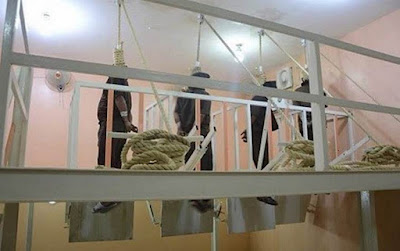 |
'People can change': Portrait of Indonesian President Joko Widodo by
death row inmate Myuran Sukumaran, Kerobokan prison, Jan. 2015 |
Foreign Affairs Minister Retno Marsudi’s short time in office has already seen a lot of controversy surrounding capital punishment: at home involving foreigners on death row and their Indonesian counterparts overseas. The ministry’s latest protest against Saudi Arabia over the recent executions of two Indonesian migrant workers — Siti Zaenab and Karni binti Medi Tarsim — illustrates the difficulties for any country to condemn the taking of life while still implementing the same punishment.
The latest diplomatic brouhaha with Saudi Arabia has revealed that there is something incoherent and illogical in our stance on the death penalty. At the moment, Jakarta is trying to implement its self-contradictory policy of brooking no contest for our own judicial murder of drug traffickers while simultaneously appealing for mercy on behalf of Indonesian nationals sentenced to death by foreign courts. And the strategy isn’t working at all.
On a rather surreal note, the spokesman for the Foreign Affairs Ministry, Armanatha Nasir, told the press that the bone of contention lay in the failure by the Saudi government to notify Indonesia of the dates and time chosen for the executions. The statement suggests that Indonesia didn’t dispute the justice behind the death sentences, merely the procedural aspect of the executions.
So, if the ministry were sufficiently satisfied with the rulings of Saudi courts in both cases, the formal pleas for mercy it made on behalf of the two migrant workers, in retrospect, were incoherent, to say the least.
Perhaps our incoherence is inevitable considering that if Indonesia makes a habit of questioning the justice system of other nations, it follows that our own judiciary may also become susceptible to the same treatment. Hence our government has chosen to focus on procedure. But in so doing, it debases the humanitarian nature of the issue.
Source: The Jakarta Globe, Op-Ed by Johannes Nugroho, April 19, 2015. Mr. Nugroho is a writer from Surabaya.


.jpg)







